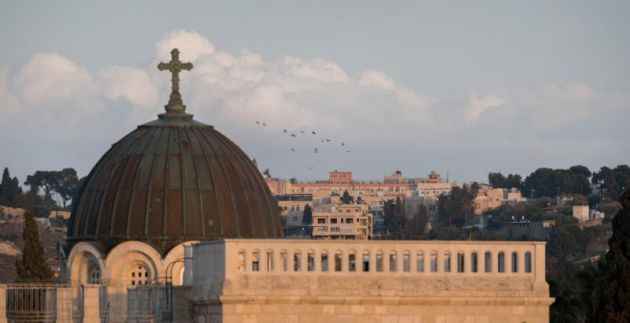Ecumenical delegation has a digital Holy Land meeting due to the war

The World Council of Churches and some of its partners have held a video conference due to being unable to have an in-person meeting because of the violent conflict raging in Gaza, the West Bank, and northern Israel.
The WCC said partners from the Middle East Council of Churches, ACT Alliance, and Caritas Internationalis accompanied it.
It released a video media briefing on the ecumenical solidarity visit to the Holy Land, which was held online on August 7-8.
Opening the session, WCC general secretary Rev. Jerry Pillay said, "We want to focus on the current situation amid the escalation of violence and how we can deal with this together."
The visit served as an opportunity to accompany member churches and ecumenical partners, listen to their voices and perspectives, amplify their calls, and remind the world of what is needed to bring about peace in the region.
Members of the delegation shared their perspectives on the visit and clarified what they believe is an urgent call to the world to act now for peace in the Holy Land.
Pillay and the rest of the delegation all regret that an in-person visit to the Holy Land, originally scheduled for 5-9 August, was postponed.
He reiterated that the online solidarity visit still gave them a deeper understanding of local churches and people.
"Our intention was really to visit Gaza, given the realities of the situation there," said Pillay.
"One of the deepest impressions on me in this visit was the conversations with the people who are working in Gaza. I think this created a deeper understanding of what was taking place.
"The world needs to stop, to listen, and the international communities need to respond more. It was deep, profound, and powerful in terms of realizing the need to get involved—and to get involved with significant change."
General secretary of the East Jerusalem YMCA Peter K. Nasir, working with Palestinian children who have experienced detention, said they are seeing a level of frustration and trauma they have never seen before.
"Many feel that there is no law, and nobody, to protect us," he said. "It is our duty as Christians to stand up against all injustice," he added.
"We have spoken about the failure of the international community. We are frankly afraid that we will be pushed out of our areas and our villages by Israel," reflected Rifat Kassis of Kairos Palestine.
Michel Abs, general secretary of the Middle East Council of Churches, described the visit as one founded in love with a message of hope.
SIGN OF SOLIDARITY
"This is a sign of solidarity, a sign of love from the international community towards the people of the area who have been suffering for a long time," he said. "This visit is done by people of faith and of love who are coming to bring hope to the people who sometimes are not seeing any more horizon for the future."
Alistair Dutton, Caritas Internationalis secretary general, said that the conversations during the visit were sobering.
"We can't talk about their homes anymore—they left those long ago, and now they are just moving from place to place in the Gaza Strip," he said. "The level of human suffering is outrageous."
Audeh Quawas, a WCC central committee and executive committee member, said the visit sent the message that people are still feeling what Palestinians are suffering.
"Peace must prevail—and peace must prevail according to international law," he said. "It's time and it's enough—and it's more than enough—killing all those innocent people."
Rudelmar Bueno de Faria, the ACT Alliance general secretary, said the shared experiences and local voices deeply moved him.
"The challenges they face are numerous and deeply interconnected," he said. "All of this is rooted in an unbelievable lack of humanity that perpetuates a long and illegal occupation of the occupied territories of Palestine. One of the most pressing challenges...is the impact of disproportional warfare."
Bishop Heinrich Bedford-Strohm, the WCC moderator, said the visit was a significant opportunity for the voice of Christianity and humanity.
"We have seen and heard so many stories of suffering in these two days," he said.
"It's a matter of faith," he added, remembering the cry of despair that Jesus uttered as Jesus died on the cross from acts of violence. "I heard this cry of despair in the stories we have heard in these two days," he said.
The pastoral solidarity visit to the Holy Land took place online on 7-8 August 2024.
The delegation included Bishop Heinrich Bedford-Strohm, WCC moderator; Rev. Jerry Pillay, WCC general secretary; Audeh Quawas, WCC central committee member; Michel Abs, Middle East Council of Churches general secretary; Erik Lysén, ACT Alliance moderator; Rudelmar Bueno de Faria, general secretary of the ACT Alliance; Alistair Dutton, Caritas Internationalis secretary general